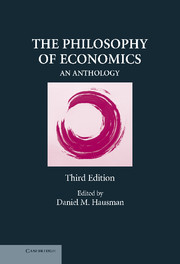Book contents
- Frontmatter
- Contents
- Introduction
- PART ONE CLASSIC DISCUSSIONS
- PART TWO POSITIVIST AND POPPERIAN VIEWS
- 7 The Methodology of Positive Economics
- 8 Testability and Approximation
- 9 Why Look Under the Hood?
- 10 Popper and Lakatos in Economic Methodology
- PART THREE IDEOLOGY AND NORMATIVE ECONOMICS
- PART FOUR BRANCHES AND SCHOOLS OF ECONOMICS AND THEIR METHODOLOGICAL PROBLEMS
- PART FIVE NEW DIRECTIONS IN ECONOMIC METHODOLOGY
- Selected Bibliography of Books on Economic Methodology
- Index
- References
10 - Popper and Lakatos in Economic Methodology
Published online by Cambridge University Press: 05 June 2012
- Frontmatter
- Contents
- Introduction
- PART ONE CLASSIC DISCUSSIONS
- PART TWO POSITIVIST AND POPPERIAN VIEWS
- 7 The Methodology of Positive Economics
- 8 Testability and Approximation
- 9 Why Look Under the Hood?
- 10 Popper and Lakatos in Economic Methodology
- PART THREE IDEOLOGY AND NORMATIVE ECONOMICS
- PART FOUR BRANCHES AND SCHOOLS OF ECONOMICS AND THEIR METHODOLOGICAL PROBLEMS
- PART FIVE NEW DIRECTIONS IN ECONOMIC METHODOLOGY
- Selected Bibliography of Books on Economic Methodology
- Index
- References
Summary
D. Wade Hands (1951–) was educated at the University of Houston and then Indiana University and has taught at the University of Puget Sound since 1980. He is one of the leading figures in contemporary economic methodology. Hands was President of the History of Science Society in 2005–2006 and is currently the editor of The Journal of Economic Methodology. His most important book, Reflection without Rules, won the Spengler Book Prize from the History of Economic Society in 2004. This essay provides a brief introduction to the ideas of Karl Popper and Imre Lakatos and to the issues that arise in applying them to the philosophical understanding of economics.
Overview
The purpose of this chapter is to critically reappraise the methodological advice offered to economists by Popperian philosophy, in particular Popperian falsificationism and Lakatos's ‘methodology of scientific research programmes’. These two philosophical positions and the difficulties they raise for economic methodology are carefully considered in the chapter. It is argued that while economists have benefited from the influence of Popperian philosophy in a number of ways, neither falsificationism nor Lakatos's methodology provide an appropriate guide to the acceptance or rejection of economic theories. The implications and caveats surrounding this argument are considered in the conclusion.
Introduction
Popperian philosophy of science has been extremely influential in economic methodology. Popperian ‘falsificationism’, first introduced into economics by Hutchison (1938), remains one of the dominant approaches to economic methodology.
- Type
- Chapter
- Information
- The Philosophy of EconomicsAn Anthology, pp. 188 - 204Publisher: Cambridge University PressPrint publication year: 2007

